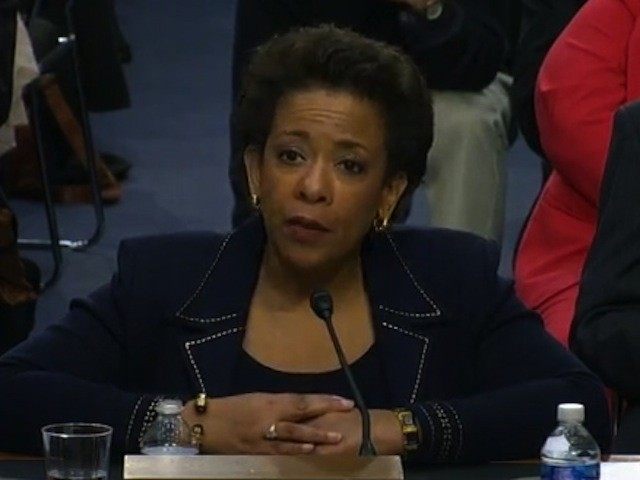Perhaps by accident, President Barack Obama’s nominee to replace Eric Holder as Attorney General of the United States actually undercut the legal justification the president has given for his executive amnesty for millions of illegal aliens during her confirmation hearing before the Senate Judiciary Committee on Wednesday.
The exchange in which she undercut Obama’s legal argument happened during a line of questioning with Sen. Mike Lee (R-UT).
“I want to speak with you briefly going back to prosecutorial discretion,” Lee started out his line of questioning. “As a former prosecutor, I’m sure you’d agree with me that there are limits to prosecutorial discretion in the sense at least that it’s intended to be an exception to the rule and not intended to swallow the rule itself. Would you agree with me that far?”
“Certainly, sir,” Lynch replied. “I believe that in every instance, every prosecutor has to make the best determination of the problems presented in their own area, in my case in my district in my priorities and within those priorities exercise discretion.”
Lee continued:
Right, so prosecutors inevitably have limited resources so it’s understandable why they would choose—when they have to prioritize—why they would put more resources for example into punishing bank robberies than they would into punishing pick-pocketers. And perhaps they might put more resources into going after pick-pocketers than they do going after people who exceed the speed limit. But at some point there are limits to this. And that doesn’t mean that it would be okay, that it would be a proper exercise of prosecutorial discretion to issue permits for people to speed, right?
“Certainly, sir,” Lynch agreed.
I think that if a prosecutor were to come to the view that they had to prioritize one crime over another, you would always still want to retain the ability—even if it was an area that was not an immediate priority—if for example it became one. Because if a particular neighborhood was being victimized, or again to use your issue of speeding, there were deaths resulting from that. You would want to have the ability to, if you could, take resources and focus on that issue. It might not be the first priority but you would want to have the ability to go back and deal with that issue.
In her answer, Lynch effectively admits that what Obama has done with executive amnesty—providing legal documentation and work permits for millions of illegal aliens, thereby legalizing their status in the United States—far exceeds any reasonable definition of prosecutorial discretion. She also said that prosecutors should keep the door open to prosecuting an illegal action that isn’t currently a priority if it becomes one eventually. So even if illegal immigration isn’t a priority right now for whatever reason, prosecutors need to be able to go after that crime later.
Illegal immigration is not a victimless crime. Harvard economist George Borjas and countless others, including U.S. Civil Rights Commissioner Peter Kirsanow, have detailed the extraordinary effect illegal immigration has on job opportunities and wages for American workers across the country—especially in the severely-impoverished black communities nationwide. Coretta Scott King, Martin Luther King, Jr.’s wife, in a 1991 in a letter to Sen. Orrin Hatch (R-UT), detailed how illegal immigration hurts workers in the black community.
We, the undersigned members of the Black Leadership Forum, write to urge you to postpone introduction of your employer sanctions repeal legislation until we have had an opportunity to report to you what we believe to be the devastating impact the repeal would have on the economic condition of un- and semi-skilled workers–a disproportionate number of whom are African-American and Hispanic; and until we have had the opportunity to propose to you and to our Hispanic brothers and sisters, what we believe could be a number of effective means of eliminating the discrimination occasioned by employer sanctions, without losing the protection sanctions provide for U.S. workers, especially minority workers.
Lee continued his line of questioning, pressing Lynch further on prosecutorial discretion.
And for that reason, prosecutorial authorities don’t typically go out and say “we’re only going to punish you for a civil violation—say a traffic offense—if you speed and it results in an accident with injuries.” They leave open the very real possibility, indeed the likelihood, that someone can and will be brought to justice in one way or another for any civil violation they commit while speeding?
“Certainly, I can’t speak to all law enforcement agencies—I know that, depending upon the agencies, sometimes the priorities are known, sometimes they’re expressed,” Lynch said. “Every office has guidelines. Certainly, the law enforcement agencies are aware of certain guidelines like for example a certain dollar amount involving certain crimes.”
Lee then honed in on the permits question.
But if someone went out and said ‘I’m going to issue a permit to someone, saying that they may speed, that they may go up to 100 miles per hour without receiving a ticket,’ unless that person were also in charge of making the law in that jurisdiction that would be a usurpation of the system by which our laws are made. Would you agree with that?
Lynch replied, “again without knowing more about it, I’m not able to respond to the hypothetical. But it certainly doesn’t sound like something a law enforcement officer would be engaged in. But again without knowing more of the facts, I’m not able to respond to your hypothetical.”

COMMENTS
Please let us know if you're having issues with commenting.